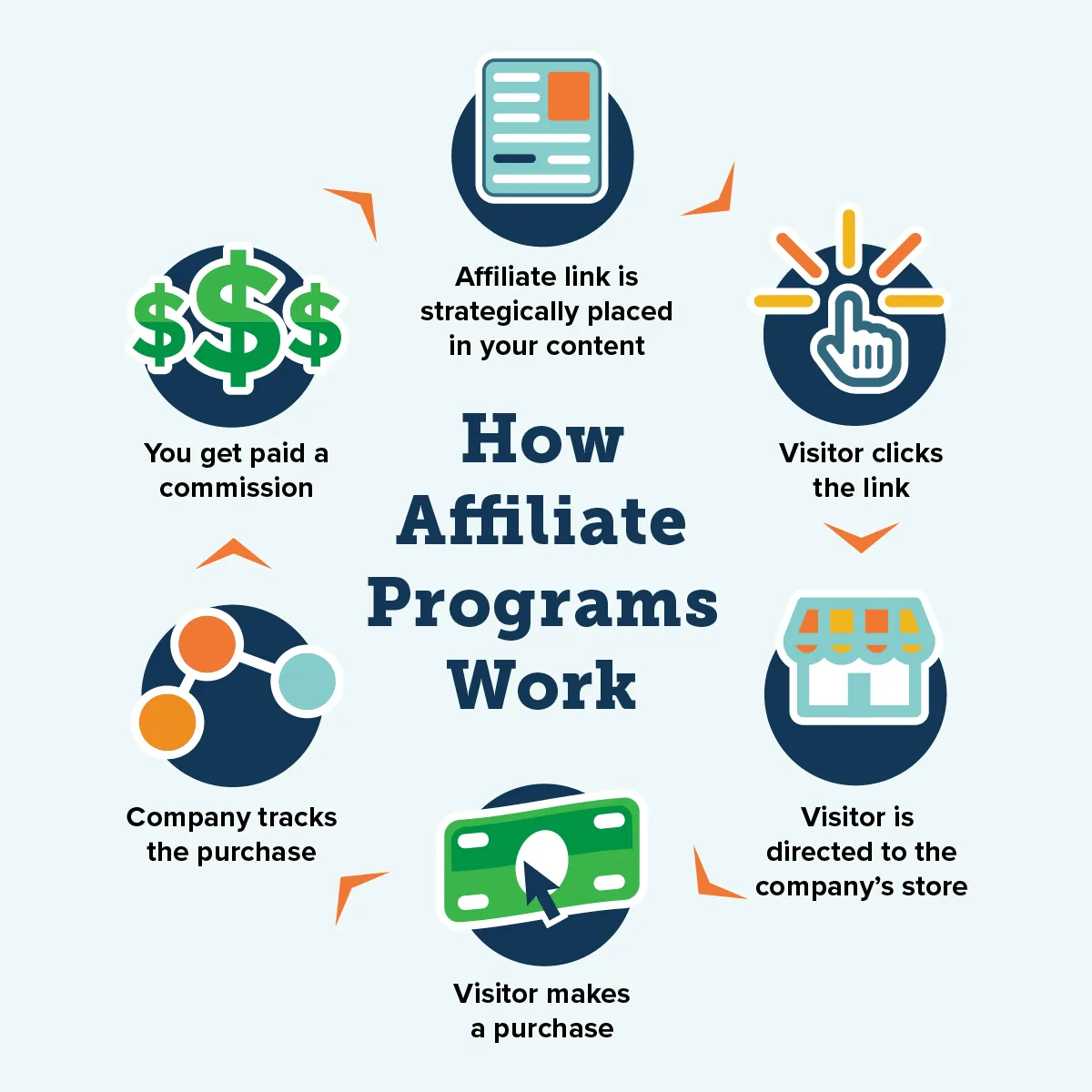Affiliate marketing is a marketing strategy where a seller pays a third-party to promote and help sell a product or service. With more than 80% of businesses using affiliates, it’s an increasingly popular way to build your revenue in 2024. Learn more about this advertising method and how to get started as an affiliate marketer in our beginner-friendly guide to affiliate marketing below.
- How Does Affiliate Marketing Work?
- How Do Affiliate Marketers Get Paid?
- How Much Do Affiliate Marketers Make?
- What Are the Benefits of Affiliate Marketing?
- How to Start Affiliate Marketing

How Does Affiliate Marketing Work?
In affiliate marketing, individuals (called affiliates) earn a commission by using a unique referral link to promote a product or service from another seller. When a consumer clicks on the affiliate link, a cookie is stored on their device, so even if they don’t convert right away, affiliates still get credit for that purchase so long as the cookie hasn’t expired.

Here’s an example of how a typical affiliate marketing program works:
- You promote something on your blog, email, or social media
- Someone views your content and clicks your affiliate link
- They make a purchase (whether in that session or later)
- You’re credited the transaction and receive your commission for the sale
How Do Affiliate Marketers Get Paid?
Typically, affiliate marketers are paid under one of four models, depending on their arrangement with the company they’re working with.
- Pay-per-sale: Affiliates are paid based on how many sales they generate with their affiliate links
- Pay-per-lead: Affiliates are paid based on the number of leads they generate
- Pay-per-click: Affiliates are paid based on how many clicks they receive on their affiliate links
- Pay-per-install: Affiliates are paid based on how many customers install a promoted app or software
How Much Do Affiliate Marketers Make?
Commission rates for affiliate sales vary by company, industry, and offer, but the average affiliate commission rate is between 5–30%. However, some affiliates can earn as much as 50%, usually when promoting digital products or online events, while other affiliate marketing programs pay a flat fee per sale instead of a percentage.
How much affiliate marketers make also depends on experience level. While more than half of all affiliates report earning less than $10,000 annually, an affiliate marketer’s salary typically increases with time. Generally, here’s what you can expect in monthly wages based on your skill level.
- Beginner: $0 to $1,000
- Intermediate: $1,000 to $10,000
- Advanced: $10,000 to $100,000
- Expert: $100,000+
What Are the Benefits of Affiliate Marketing?
As a method of generating near-passive income, affiliate marketing comes with a number of benefits. For one, you have plenty of flexibility, since you’re using your own platforms and choosing the products or services that you want to promote. Below are some additional reasons you should start affiliate marketing.
- High ROI: You have the potential to earn a high salary and supplement your revenue streams with minimal effort.
- Low startup costs: You don’t need to create or purchase the promoted products, and affiliate programs are free.
- Minimal risk: Because you don’t need to own the inventory, you’re not left with unsold product.
- Versatile: You can promote a variety of products across any industry or niche.
How to Start Affiliate Marketing
Even though affiliate marketing plans are considered a passive income strategy, you need to put in some effort to actually be successful. It takes more than joining an affiliate program and adding referral links to your content. Here are the affiliate marketing strategies you need to follow to become a higher-earning affiliate marketer.
Find a Niche
If you want to break into the industry, you’ll first need to choose a niche—a category of products and services—to promote. Affiliate marketing is becoming an increasingly competitive field, so you’ll want to find an area where you have an edge. These are the questions you can ask yourself to determine your niche:
- What am I passionate about?
- What am I knowledgeable about?
- What pain points does my target audience have?
- What is there a market for?
If you choose an affiliate niche you’re interested in and your audience needs, you’re more likely to create valuable content, which will draw in visitors and help increase your commission earnings.
Pick a Product
Once you’ve chosen a niche, you’ll need to narrow down which products you’d like to promote. Choose products that:
- Fit within your chosen niche
- Satisfy a pain point your audience has
- Can be linked to the topic of your content
For example, if you’re a personal trainer and fitness influencer with an audience of busy stay-at-home parents who are looking for quick and convenient at-home fitness routines, you might choose affiliate products in the home fitness category like resistance bands or foldable treadmills and services like online yoga classes that help your followers do fast workouts without going to a gym.
Choose Your Content Platform
Affiliate marketing is compatible with most online platforms, so whether you run a blog, YouTube channel, social media account, or podcast, you can incorporate affiliate links into a lot of your content.
But let the type of content you’re making inform your platform. If you plan to create short-form video content, it’ll likely perform better on social media platforms like TikTok or Instagram Reels than YouTube. If you want to make content based around written copy, starting a blog might be your best bet.
Join Affiliate Programs
Now that you’ve nailed down your niche, products, and where you plan to promote them, you have to partner with top affiliate programs in your industry, whether that’s Amazon Associates for e-commerce businesses, HubSpot Affiliate Program for marketers, or affiliate networks like ClickBank or Awin.
Joining an affiliate program will allow you to create your affiliate links, specify your promotion, and arrange pay agreements. By being selective about the affiliate programs you join, you increase the likelihood of actually converting the people who follow your links. Here’s what to look for when researching affiliate options.
- Reputation among affiliates
- Commission rate (around 20% is typically seen as fair)
- Earnings-per-click (EPC) rate
Search public income reports to find out how much money affiliate marketers make with programs you’re interested in, or reach out to online merchants directly for details. Remember to ask about their average conversion rates and what commissions their top earners typically make.
Create Valuable Content
With the average daily time spent online expected to be over eight hours in 2023, your audience is exposed to a ton of content every day. Your success with affiliate marketing will be based in part on how well you make content that engages your audience and sticks out from the crowd. Below are a few affiliate marketing strategies to build valuable content.
- Incorporate Personalization: Share personal experiences and stories related to the products you’re promoting. Only recommending products you’ve used and truly believe in builds trust and credibility with your audience.
- Use Compelling Visuals: Incorporate eye-catching images, graphics, and videos to enhance your message and make your promotion more engaging.
- Craft Catchy Hooks: Your headline is the first thing your audience sees, so make it attention-grabbing, compelling, and maybe a little bit funny to entice readers to keep reading or watching.
- Showcase Benefits: Clearly explain how your promoted product or service can enhance your audience’s lives.
- Feature Comparisons: Create comparison guides that highlight the pros and cons different products within the same niche. Highlight pros and cons to help your audience make informed decisions.
- Mention Reviews: If a product is high-rated and liked by customers, make that a selling point so that your audience doesn’t have to just take your word for it.
- Include Call-to-Actions (CTAs): Write effective CTAs with descriptive anchor text on your affiliate links that guides your audience on what to do next.
- Offer Exclusive Bonuses: Sweeten the deal for your audience by offering exclusive bonuses when they purchase through your affiliate links. These bonuses could be e-books, templates, courses, or other valuable resources.
Engage with Your Audience
Growing your audience can boost the number of people who click on your affiliate links, which in turn increases your profit. But to build up your audience, you need to foster a relationship with them.
Focus on creating a genuine connection with your followers by staying authentic to your brand. Try keeping your topics consistent, be transparent, and personalize your content. Nurturing a strong audience takes time and effort, but affiliate marketing can’t be effective without strong audience engagement.
Optimize for SEO
Especially if you’re relying on your website as your platform for affiliate marketing, you should do everything possible to get your site to rank higher in search engine results pages. Optimizing your content for search can lead to more organic traffic and brand visibility, meaning more customers, purchases, and profit.
Creating high-quality content is already a start to your SEO strategy, but you can also optimize on-page SEO by using HTML page structure, adding high-ranking keywords without keyword cannibalization, building a quality backlink profile, and designing a mobile-friendly website to ensure search engines can locate, crawl, and index your pages.
Try Email Marketing
Unlike websites and social media profiles, email affiliate marketing programs enable you to reach out to your audience directly. You can segment your audience and send a variety of content to appeal to different interests.
Use emails to provide new content, keep your brand visible, and give your audience relevant updates while incorporating affiliate links. To persuade people to sign up for your emails and continue growing your email list, offer something of value, like free trials, promo codes, and more.
Consider User Experience
To ensure your audience clicks on your affiliate links, make sure to:
- Test link placement: Make your links flow naturally in content and determine where you get the most interactions with them—whether in blog post introductions or the center of social media stories.
- Shorten your links: Shortening affiliate links makes them look nicer (less spammy), easier to share, and less likely to break, which helps people trust and engage with them more.
- Balance your content: Don’t overwhelm your audience with too many links. While there’s no specific rule, a common guideline is to aim for no more than 10-20% of your content containing affiliate links.
- Make links obvious: Utilize eye-catching callouts like boxes, tables, and buttons to make the post reader-friendly and appealing.
- Check links often: Regularly make sure they’re working. If they aren’t, it’s a sign to update your content.
Follow FTC Disclosure Requirements
No matter what platform you use, the Federal Trade Commission’s Disclosure legally requires you to reveal if you’re making money from your promotions to your audience. To avoid potential legal complications, you should include an easily viewable disclosure detailing your relationship with your partner company somewhere on your page like in the video description.
And remember that receiving free products, credits, discounts, special access, or other kinds of favors in exchange for your promotion still counts as compensation, so you’re required to mention that to your audience.
Need support with your affiliate marketing strategies? Hurrdat Marketing offers content marketing, email marketing, social media marketing, and search engine optimization services to get you started as an affiliate marketer. Contact us today!



